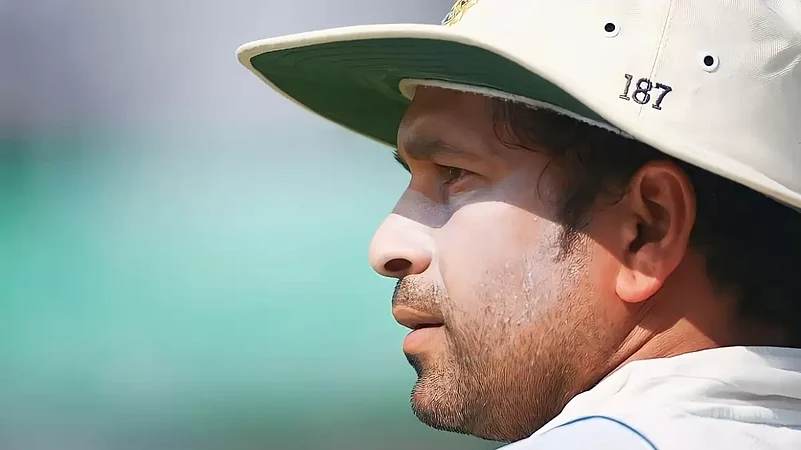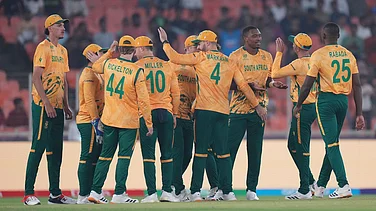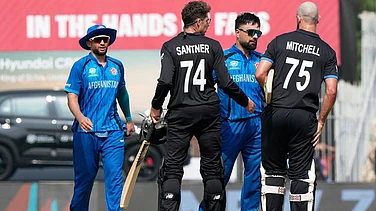Time, like an unsentimental Irani restaurant owner, does not allow lingering, regardless of whether you are a cricket legend or a commoner. On April 24, Sachin Tendulkar turns 50. Yesterday’s curly-mopped teenage prodigy is now half a century old.
While we let that sink in, the commemoration has started. The Mumbai Cricket Association (MCA) has announced it will build a statue of Tendulkar’s at the Wankhede Stadium. A few days ago, on a breezy summer evening on the lawns of the Taj Land’s End in Bandra, Tanishq, the jewellery arm of Titan watches, announced a collection of solitaires and bling named after Tendulkar. Simon & Schuster have released a book titled ‘Sachin @50’. There are likely to be some more events as the date approaches.
Tendulkar has been a part of Indian consciousness and identity since the 1980s. And that evening in Bandra, various eras were evoked intentionally or coincidentally. Apple logos on laptops on the audio console glowed in the dusk as Arun Narayan, Tanishq’s VP, Marketing and Retail, recalled waking up early for Tendulkar matches when he was a student at IIM Kolkata. ‘Besharam Rang’ played in the background after Manasi Scott, the singer and actor, finished her performance and shared her memories of the Tendulkar years with ‘Outlook’. Minutes earlier, she was on stage belting out ‘Sachin, Sachin’, the AR Rahman and Sukhwinder Singh anthem based on the popular stadium chant, with a few tweaks of her own.
“We would hide radios in our desks at school when a match was going on,” Scott told ‘Outlook’ backstage, her sequined jacket glinting in the bluish white light of the arena. “‘Sachin, Sachin!’ There’s no other name you chant like that. It captures what the Master Blaster means to the nation. It was an honour to do this today.”
To be fair, Scott admired many cricketers and athletes in her college years. But her respect for Tendulkar rose when, many years ago, he went out of his way to sign an autograph for her son.
“It was after a match and he was clearly tired and not in a mood to give autographs. But when he saw my child, who was only eight or nine, he came up and signed. That’s something I really appreciate,” Scott said.
Narayan recalled the TV room at his IIM Kolkata hostel in the Nineties. If India were playing in Australia or New Zealand, the telecast would start around 4.30 am. Even at that early hour, the room would be full.
“You can picture this, a hostel of 200 cricket loving boys at IIM Kolkata, and one TV room. And at 4.30 in the morning the room would be packed,” Narayan said. “And if India fielded first, by 4.35 the room would become half empty. That’s what Sachin meant to our generation.”
Narayan later explained to ‘Outlook’ the thought behind partnering with Tendulkar at age 50, an age when a celebrity is considered past his sell-by date.
“Sachin as an icon is timeless,” Narayan said. “At one level, he is a cricket legend, at another he is a Bharat Ratna. We also believe he stands for certain values that make him a very good fit for us. Even after 11 years no one has come close to his century of centuries.”
It is hard enough to score a few centuries in an era that boasted some of the best bowling attacks ever, comprising the likes of Curtly Ambrose, Courtney Walsh, Wasim Akram, Waqar Younis, Allan Donald, Shane Warne and Glenn McGrath. To score one hundred centuries is beyond comprehension, unless you are Virat Kohli, who is going strong with 75 hundreds as of now.
The 100 hundreds is just one of the many records Tendulkar holds. His stats are so insanely vast and complete that they are a slap in the face of loser trolls and cynics. One of the frequent digs of this mediocre breed is, “Oh, but he rarely played well in the second innings of a Test.”
Tendulkar’s second innings record, actually, is among the best. In 132 innings, he made 4621 runs at an average of 42.78. He hit 13 centuries in the second innings and 22 fifties.
Rahul Dravid has a great second innings reputation and deservedly so. Still, his numbers are marginally lower than Tendulkar’s. In 122 innings, Dravid scored 4183 runs at an avg of 41.83, with six centuries and 24 fifties.
Virender Sehwag, Tendulkar’s partner in several partnerships, had 2148 runs in 76 innings at an average of 30.25, with one century and 14 fifties.
There are two celebrated names who average better than Tendulkar in the second innings. They are Sunil Gavaskar (90 innings, 3963 runs, 51.46 avg, 11 centuries, 22 fifties) and VVS Laxman (91 innings, 3471 runs, 48.88 avg, 5 centuries, 23 fifties). Kohli too has good numbers. Currently, in 77 innings, he has 2580 runs at an average of 37.94, with five centuries and 15 fifties).
But by no means was Tendulkar a slouch in the second innings. And not always is the second innings more challenging than the first.
There is a bigger, largely fallacious grouse against Tendulkar – that he was selfish and his innings did not lead to many India victories. Those who propagate such drivel conveniently forget the years he carried the team when some of his teammates were throwing their wickets for an Armani jacket. They also dumbly refuse to concede that the runs Tendulkar scored ended up in the team’s total. There were no separate scoreboards for Sachin Tendulkar and India. Most convincingly, many of his famous performances led to great India victories, such as the 2011 World Cup, where he was India’s top-scorer, the 2008 CB Series in Australia, Sharjah 1998, and the 1993 Hero Cup, where he starred with the ball.
Tendulkar’s career was also a game-changer for the economy of cricket. In 1995, he was signed on for a few million dollars, an unheard of amount for a cricketer then, by the swaggering Mark Mascarenhas. A little later, WorldTel, Mascarenhas’ company, also signed a deal with the Indian cricket board to televise matches. In a span of a few months, blurry Doordarshan telecasts made way for clear visuals and star commentators. This brought in more advertising and rights money, much of it triggered by Tendulkar’s popularity.
Yes, there were a few unsavoury moments in Tendulkar’s career. When Fiat gave him a Ferrari for breaking Don Bradman’s record of 29 Test centuries, he asked for the import duty of Rs 1.13 crore to be waived, as the car was a gift. Many felt the request was unbecoming of Tendulkar. Then there was the 2004 Multan Test, when captain Dravid’s declaration left Tendulkar six short of a double century, much to Tendulkar’s pique.
But overall, the plusses of Tendulkar’s career outscore the negatives. Despite the best efforts of the crab mentality bunch, Sachin Tendulkar remains a national treasure.


























